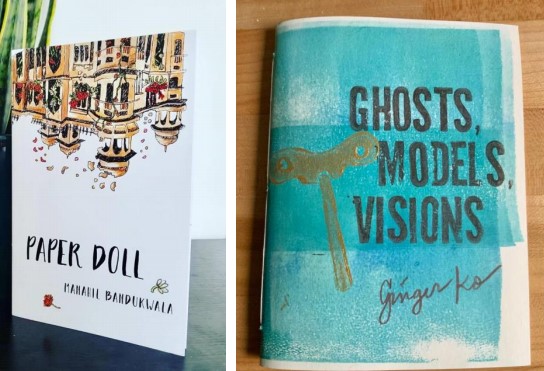Final Portfolio
Well, folks, we’ve survived a memorable semester. You’ve kept up with this class and written some astounding work.
There is no final exam for this class; however, you must turn in a Final Portfolio that showcases the work you’ve produced this semester. This post will detail what is expected, the order, how to save and submit the Final Portfolio, and how it will be evaluated.
Create Your Own Chapbook
According to Webster’s Dictionary, a chapbook is “a small book containing ballads, poems, tales, or tracts.” For your Final Portfolio, you are going to create a chapbook of your work!
Perhaps you’re wondering, “How do I create a chapbook, Professor?”
My response? “Ah, I’m glad you asked, because the answer is below!”
First, review all of your major writing assignments. You have created (or will be creating soon) several major writing assignments: two memoir pieces, two short stories, two poems, at least one dialogue, and ten journal entries. I’ve read and commented on many of your major assignments—I’ve given praise, asked questions, and made suggestions for those assignments.
Next, choose one of the memoirs, one of the short stories, one of the poems, and one of the dialogues to revise[1] for your chapbook. What you choose is up to you, but I’d recommend selecting work that you’re especially proud of or that you’ve learned something significant during the writing—essentially, what you’d allow others to read!
Then, go through the journals and select two that show something about your evolution as a writer. You don’t have to revise these entries, but if you want to revise a little for clarity, go ahead!
While you’re doing that, begin work on your Final Reflection (there’s a longer document about this that I’ll talk about soon). Often, when authors present a collection of work, they provide an introduction to the reader. Think of your Final Reflection as an introduction to the reader. Tell them what you’ve learned about yourself as a writer this semester.
Gather everything in one document with a cover page. Make sure each piece is on its own page. Order the document as follows:
- Final Reflection
- Memoir
- Short Story
- Poem
- Dialogue
- Journals
The cover page will be the cover of the chapbook. This is where you get to have a little textual/visual fun. Have your full name on the cover, of course, but everything else is up to you!
Think of a creative title for your chapbook. Some examples of chapbooks:
- When, by the Titanic, by John Pursley III
- Why I Kick At Night, by Ron Drummond
- Five-hundred Widowers in a Field of Chamomile, by John Surowiecki
- The Nightmare Parable, by Do Gentry

Use a graphic you’ve created, a photograph, a selfie, or just a fun font for your title on the cover. Again, it’s up to you, but think of this in a marketing sense. You’ve probably heard the phrase “don’t judge a book by its cover,” but we so often do this with books, magazines, websites, etc. Imagine you’re selling your chapbook in a bookstore—how would you make it stand out, convince someone to pick it up?
How to Submit
- Save the document as a PDF file. Don’t know how to save a Word Doc into a PDF? Detailed instructions are at the bottom of this post.
- Upload the PDF file to a post OpenLab. Don’t know how to upload a file on OpenLab? See Step 1.
- If your file is larger than 10,000 KB (10 MB), you won’t be able to upload it onto OpenLab. This probably won’t be an issue, but be aware of this before the deadline!
- Title the post Student Name, Final Portfolio and save it under Final Portfolio on our class website.
- The Final Portfolio must be posted by 11:59 PM (just before midnight) on Tuesday, December 14! I have to post quickly after the semester’s over–which gives me a very short window of time to evaluate your portfolios and calculate your grades. There is no wiggle room for you or me!
Evaluation of the Final Portfolio
There are 225 points possible for the Final Portfolio. If assignments are missing, those points will be deducted from the overall score. If the Portfolio is not submitted by the due date, 225 points will be deducted from your final grade. (This is worth 30% of your final grade.)
Final Reflection 100 points possible
Memoir 25 points possible
Short Story 25 points possible
Poetry 25 points possible
Dialogue 25 points possible
Two Journals 25 points possible
Final Reflection Details
We are now at our final writing assignment of an incredibly difficult semester. I am so proud of you all for making it to this point. Now it is time for you, as the title suggests, reflect on your work over the semester. For this final assignment, reflect upon the following questions:
- What have you learned about yourself as a writer this semester?
- What have you learned about yourself as a reader this semester?
- How will you be able to use what you have learned this semester and transfer that knowledge to other writing situations—either in college or in your community?
The Reflection is due with your Final Portfolio (chapbook) and should be a minimum of 600 words.
As a way to begin your Final Reflection, look back through all your work for this class: memoir, short story, poetry, dialogue, journal assignments, reflections, and so on. As you browse through your work, ask yourself about and take notes on the following questions:
- How would you compare/contrast work done early on in the semester to now?
- What was your favorite/least favorite assignment and why?
- What are some notable lessons that have stuck with you after completing certain assignments?
- What changed in your writing (and reading and thinking) as the genres changed?
- What were your early assumptions/beliefs about yourself and writing? Have they since changed? Explain.
- What was your experience revising assignments?
- Was there any peer feedback that stands out to you and why?
- How did you adapt to an online writing class? What were the challenges, if any?
- What was particularly challenging for you in our course this semester and how did you overcome it (or attempt to)?
Don’t simply answer the above questions in your final reflection; they are just meant to help you brainstorm ideas. You don’t have to reflect upon each question, either. You may really have a lot to say about a few, and not much to say about others. This isn’t just you writing off-the-top of your head; this is a finished piece of writing. Treat yourself as a respected author who has lived through a difficult time: you are someone with something to say.
The first draft of your Final Reflection is due Tuesday, December 7. Post it under Reflections and title it Full Name, Final Reflection by class time on Tuesday. It doesn’t have to be complete, but have something to share!
The final draft should be saved in the Final Portfolio (aka Chapbook).
Here’s what I will be looking for in the Final Reflection:
- Attention to audience. This essay will be the first item any reader will see in your Final Portfolio (aka Chapbook). This essay will set a “tone” for all the work that follows. Don’t just list off a bunch of random opinions about your writing—write about what you’ve learned.
- Attention to organization. This does not have to be a traditional organization, but you should have paragraphs (not just a giant paragraph, please) and some reason for why they’re in the order they’re in!
- Care. Proofread. Make sure it’s long enough. As usual, you can use whatever language you see fit to use, but make decisions about your language—that is, the words that are there should be there for a reason.
For the Final Portfolio (aka Chapbook) pieces besides the Final Reflection (Memoir, Short Story, Poetry, and Dialogue), I will be looking for…
- Attention. Make sure the constraints of each writing assignment are followed.
- Care. All assignments proofread and on their own page.
[1] You must do a significant revision of each piece in your Final Portfolio. What is a “significant revision”? Look at the comments I made on the evaluation, the suggestions of your Cohort, etc. Make the changes accordingly.





Leave a Reply